Psychosis Treatment and Research
VerifiedAdded on 2020/06/06
|8
|2912
|435
AI Summary
This assignment delves into the complex world of psychosis, focusing on current treatment strategies and ongoing research. It examines various antipsychotic medications used to manage psychotic symptoms, analyzes the effectiveness of treatments over time, and discusses the role of g...
Read More
Contribute Materials
Your contribution can guide someone’s learning journey. Share your
documents today.
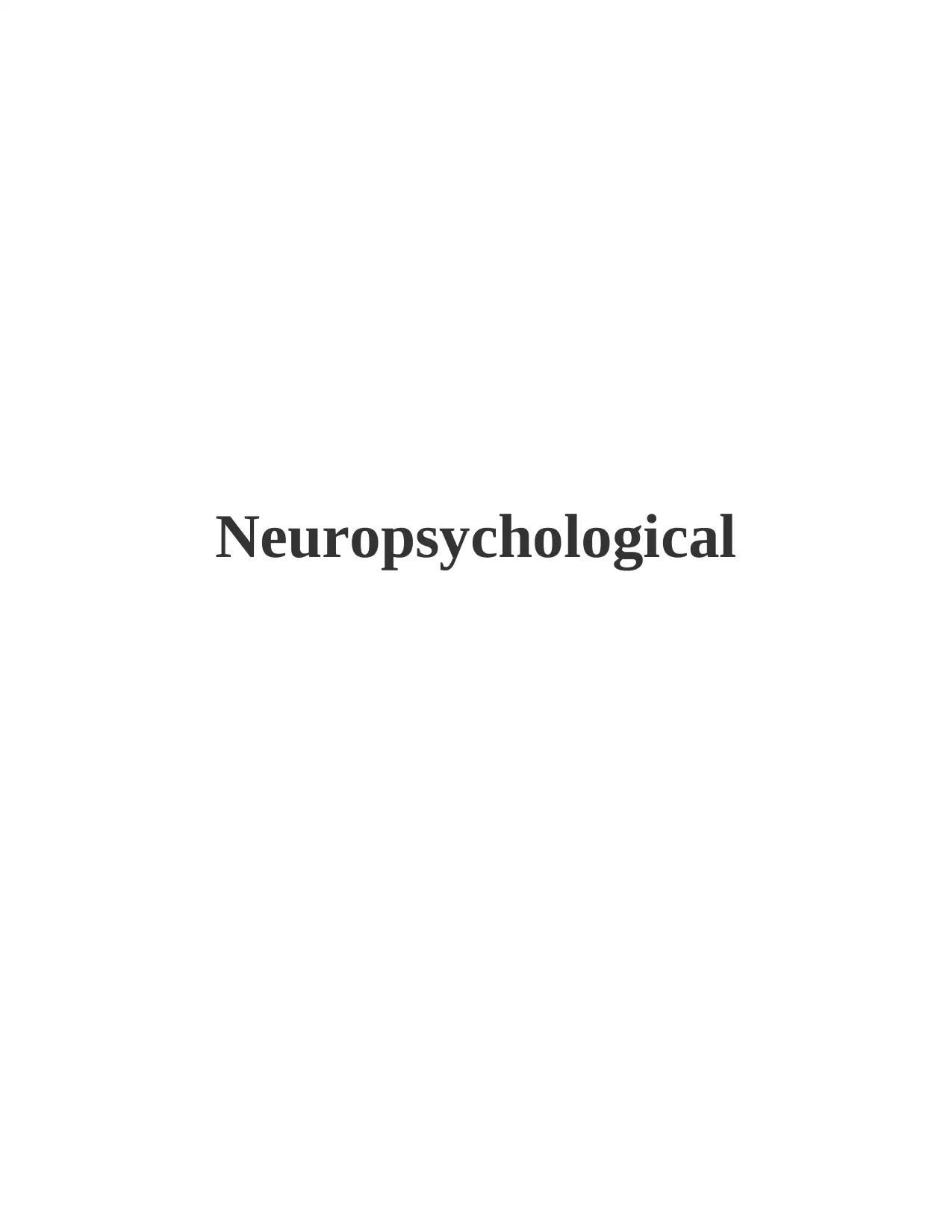
Neuropsychological
Secure Best Marks with AI Grader
Need help grading? Try our AI Grader for instant feedback on your assignments.
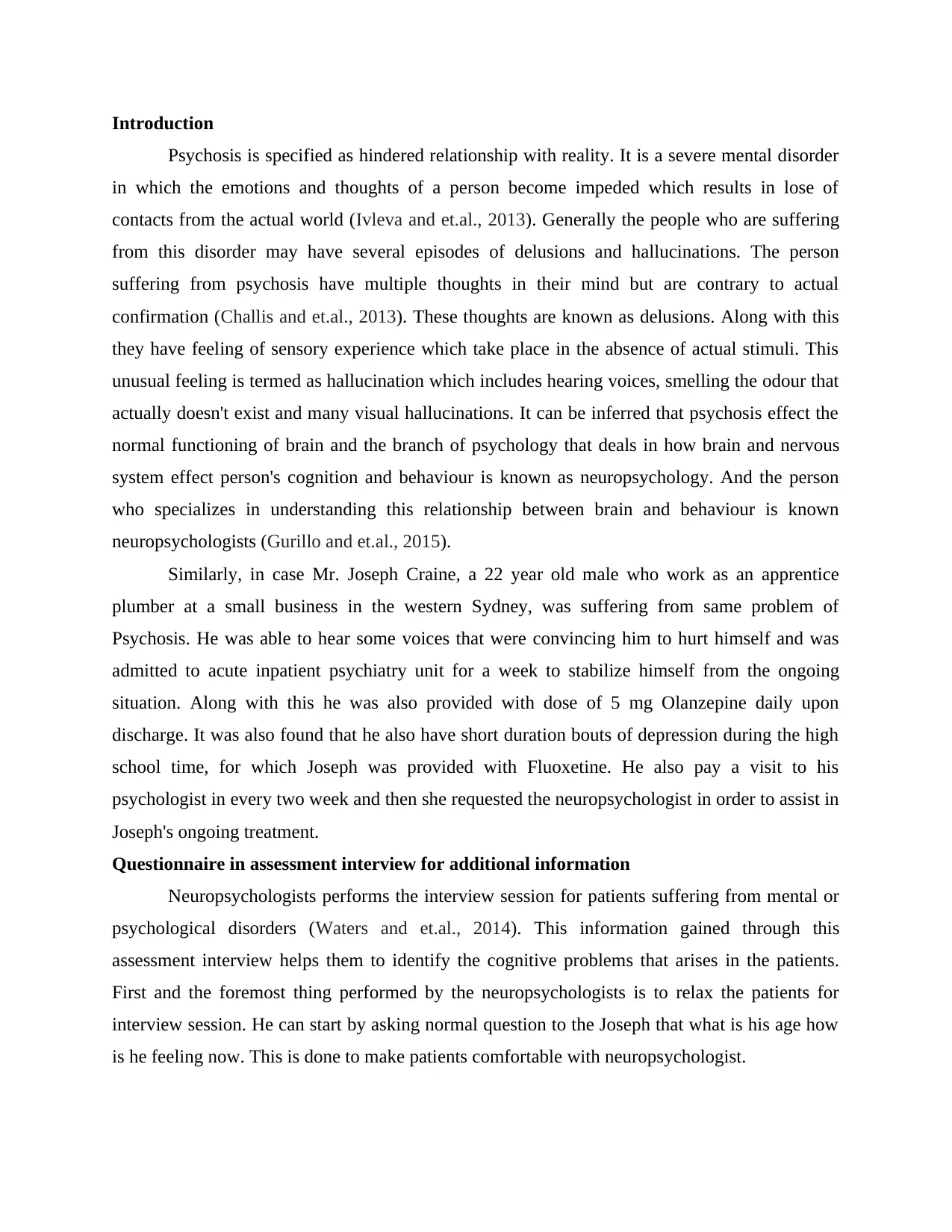
Introduction
Psychosis is specified as hindered relationship with reality. It is a severe mental disorder
in which the emotions and thoughts of a person become impeded which results in lose of
contacts from the actual world (Ivleva and et.al., 2013). Generally the people who are suffering
from this disorder may have several episodes of delusions and hallucinations. The person
suffering from psychosis have multiple thoughts in their mind but are contrary to actual
confirmation (Challis and et.al., 2013). These thoughts are known as delusions. Along with this
they have feeling of sensory experience which take place in the absence of actual stimuli. This
unusual feeling is termed as hallucination which includes hearing voices, smelling the odour that
actually doesn't exist and many visual hallucinations. It can be inferred that psychosis effect the
normal functioning of brain and the branch of psychology that deals in how brain and nervous
system effect person's cognition and behaviour is known as neuropsychology. And the person
who specializes in understanding this relationship between brain and behaviour is known
neuropsychologists (Gurillo and et.al., 2015).
Similarly, in case Mr. Joseph Craine, a 22 year old male who work as an apprentice
plumber at a small business in the western Sydney, was suffering from same problem of
Psychosis. He was able to hear some voices that were convincing him to hurt himself and was
admitted to acute inpatient psychiatry unit for a week to stabilize himself from the ongoing
situation. Along with this he was also provided with dose of 5 mg Olanzepine daily upon
discharge. It was also found that he also have short duration bouts of depression during the high
school time, for which Joseph was provided with Fluoxetine. He also pay a visit to his
psychologist in every two week and then she requested the neuropsychologist in order to assist in
Joseph's ongoing treatment.
Questionnaire in assessment interview for additional information
Neuropsychologists performs the interview session for patients suffering from mental or
psychological disorders (Waters and et.al., 2014). This information gained through this
assessment interview helps them to identify the cognitive problems that arises in the patients.
First and the foremost thing performed by the neuropsychologists is to relax the patients for
interview session. He can start by asking normal question to the Joseph that what is his age how
is he feeling now. This is done to make patients comfortable with neuropsychologist.
Psychosis is specified as hindered relationship with reality. It is a severe mental disorder
in which the emotions and thoughts of a person become impeded which results in lose of
contacts from the actual world (Ivleva and et.al., 2013). Generally the people who are suffering
from this disorder may have several episodes of delusions and hallucinations. The person
suffering from psychosis have multiple thoughts in their mind but are contrary to actual
confirmation (Challis and et.al., 2013). These thoughts are known as delusions. Along with this
they have feeling of sensory experience which take place in the absence of actual stimuli. This
unusual feeling is termed as hallucination which includes hearing voices, smelling the odour that
actually doesn't exist and many visual hallucinations. It can be inferred that psychosis effect the
normal functioning of brain and the branch of psychology that deals in how brain and nervous
system effect person's cognition and behaviour is known as neuropsychology. And the person
who specializes in understanding this relationship between brain and behaviour is known
neuropsychologists (Gurillo and et.al., 2015).
Similarly, in case Mr. Joseph Craine, a 22 year old male who work as an apprentice
plumber at a small business in the western Sydney, was suffering from same problem of
Psychosis. He was able to hear some voices that were convincing him to hurt himself and was
admitted to acute inpatient psychiatry unit for a week to stabilize himself from the ongoing
situation. Along with this he was also provided with dose of 5 mg Olanzepine daily upon
discharge. It was also found that he also have short duration bouts of depression during the high
school time, for which Joseph was provided with Fluoxetine. He also pay a visit to his
psychologist in every two week and then she requested the neuropsychologist in order to assist in
Joseph's ongoing treatment.
Questionnaire in assessment interview for additional information
Neuropsychologists performs the interview session for patients suffering from mental or
psychological disorders (Waters and et.al., 2014). This information gained through this
assessment interview helps them to identify the cognitive problems that arises in the patients.
First and the foremost thing performed by the neuropsychologists is to relax the patients for
interview session. He can start by asking normal question to the Joseph that what is his age how
is he feeling now. This is done to make patients comfortable with neuropsychologist.
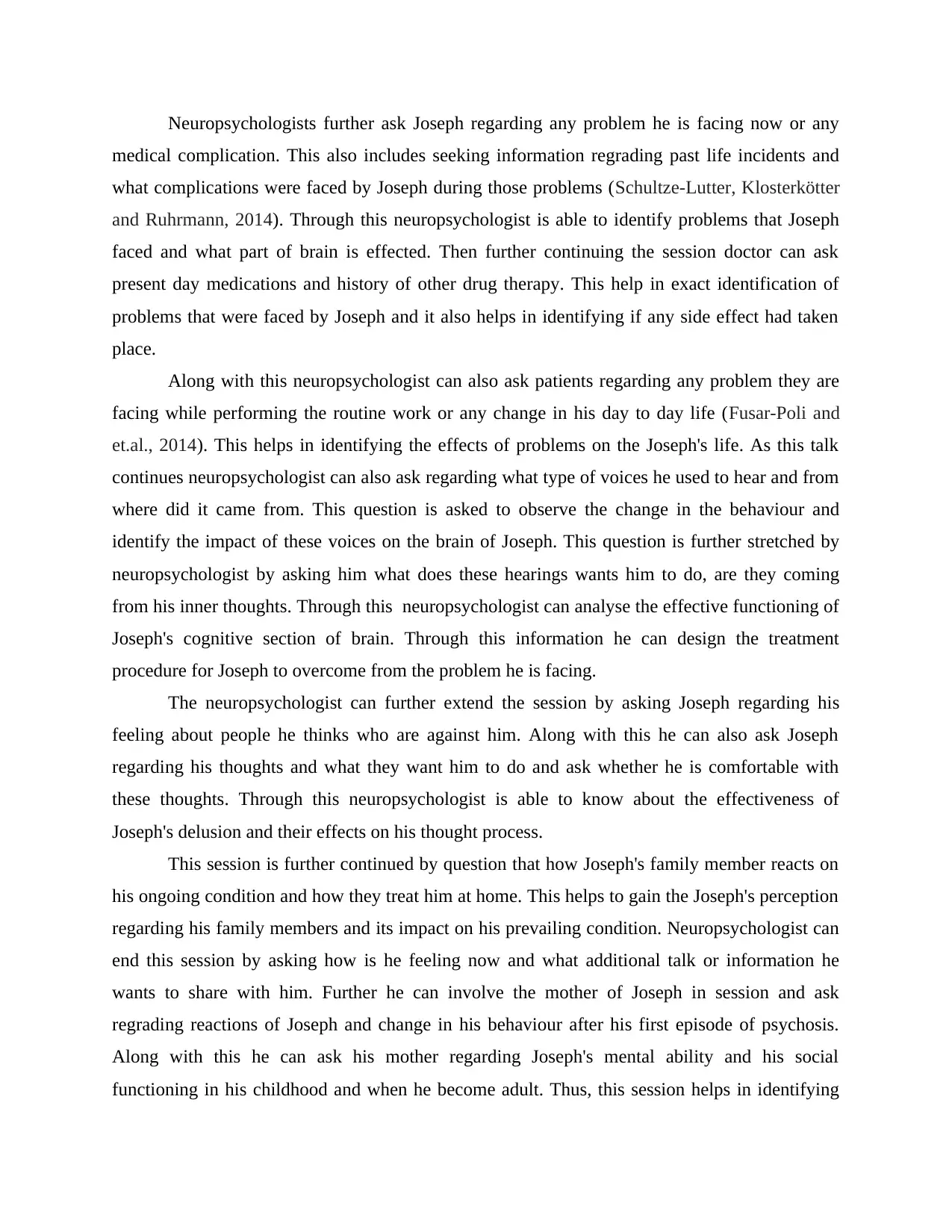
Neuropsychologists further ask Joseph regarding any problem he is facing now or any
medical complication. This also includes seeking information regrading past life incidents and
what complications were faced by Joseph during those problems (Schultze-Lutter, Klosterkötter
and Ruhrmann, 2014). Through this neuropsychologist is able to identify problems that Joseph
faced and what part of brain is effected. Then further continuing the session doctor can ask
present day medications and history of other drug therapy. This help in exact identification of
problems that were faced by Joseph and it also helps in identifying if any side effect had taken
place.
Along with this neuropsychologist can also ask patients regarding any problem they are
facing while performing the routine work or any change in his day to day life (Fusar-Poli and
et.al., 2014). This helps in identifying the effects of problems on the Joseph's life. As this talk
continues neuropsychologist can also ask regarding what type of voices he used to hear and from
where did it came from. This question is asked to observe the change in the behaviour and
identify the impact of these voices on the brain of Joseph. This question is further stretched by
neuropsychologist by asking him what does these hearings wants him to do, are they coming
from his inner thoughts. Through this neuropsychologist can analyse the effective functioning of
Joseph's cognitive section of brain. Through this information he can design the treatment
procedure for Joseph to overcome from the problem he is facing.
The neuropsychologist can further extend the session by asking Joseph regarding his
feeling about people he thinks who are against him. Along with this he can also ask Joseph
regarding his thoughts and what they want him to do and ask whether he is comfortable with
these thoughts. Through this neuropsychologist is able to know about the effectiveness of
Joseph's delusion and their effects on his thought process.
This session is further continued by question that how Joseph's family member reacts on
his ongoing condition and how they treat him at home. This helps to gain the Joseph's perception
regarding his family members and its impact on his prevailing condition. Neuropsychologist can
end this session by asking how is he feeling now and what additional talk or information he
wants to share with him. Further he can involve the mother of Joseph in session and ask
regrading reactions of Joseph and change in his behaviour after his first episode of psychosis.
Along with this he can ask his mother regarding Joseph's mental ability and his social
functioning in his childhood and when he become adult. Thus, this session helps in identifying
medical complication. This also includes seeking information regrading past life incidents and
what complications were faced by Joseph during those problems (Schultze-Lutter, Klosterkötter
and Ruhrmann, 2014). Through this neuropsychologist is able to identify problems that Joseph
faced and what part of brain is effected. Then further continuing the session doctor can ask
present day medications and history of other drug therapy. This help in exact identification of
problems that were faced by Joseph and it also helps in identifying if any side effect had taken
place.
Along with this neuropsychologist can also ask patients regarding any problem they are
facing while performing the routine work or any change in his day to day life (Fusar-Poli and
et.al., 2014). This helps in identifying the effects of problems on the Joseph's life. As this talk
continues neuropsychologist can also ask regarding what type of voices he used to hear and from
where did it came from. This question is asked to observe the change in the behaviour and
identify the impact of these voices on the brain of Joseph. This question is further stretched by
neuropsychologist by asking him what does these hearings wants him to do, are they coming
from his inner thoughts. Through this neuropsychologist can analyse the effective functioning of
Joseph's cognitive section of brain. Through this information he can design the treatment
procedure for Joseph to overcome from the problem he is facing.
The neuropsychologist can further extend the session by asking Joseph regarding his
feeling about people he thinks who are against him. Along with this he can also ask Joseph
regarding his thoughts and what they want him to do and ask whether he is comfortable with
these thoughts. Through this neuropsychologist is able to know about the effectiveness of
Joseph's delusion and their effects on his thought process.
This session is further continued by question that how Joseph's family member reacts on
his ongoing condition and how they treat him at home. This helps to gain the Joseph's perception
regarding his family members and its impact on his prevailing condition. Neuropsychologist can
end this session by asking how is he feeling now and what additional talk or information he
wants to share with him. Further he can involve the mother of Joseph in session and ask
regrading reactions of Joseph and change in his behaviour after his first episode of psychosis.
Along with this he can ask his mother regarding Joseph's mental ability and his social
functioning in his childhood and when he become adult. Thus, this session helps in identifying
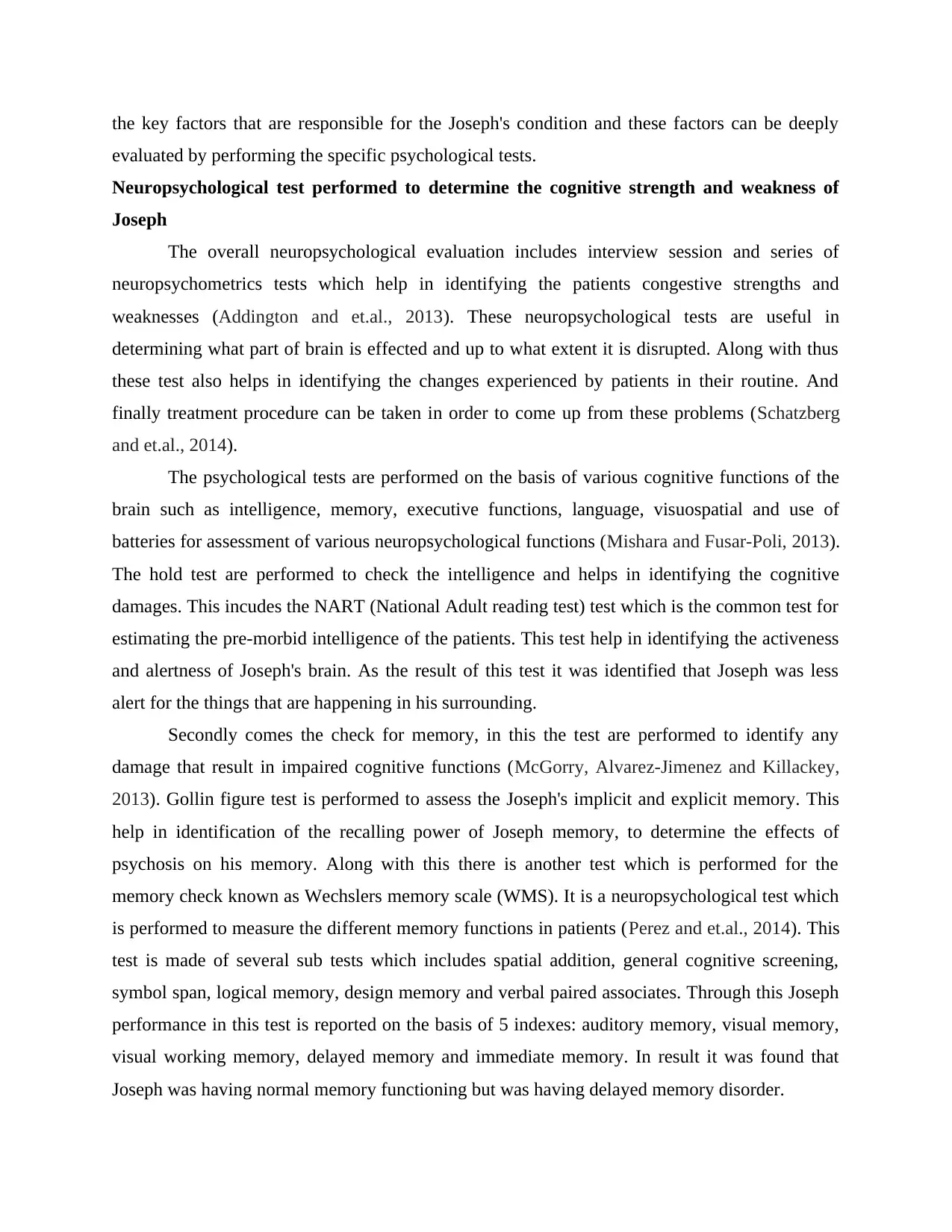
the key factors that are responsible for the Joseph's condition and these factors can be deeply
evaluated by performing the specific psychological tests.
Neuropsychological test performed to determine the cognitive strength and weakness of
Joseph
The overall neuropsychological evaluation includes interview session and series of
neuropsychometrics tests which help in identifying the patients congestive strengths and
weaknesses (Addington and et.al., 2013). These neuropsychological tests are useful in
determining what part of brain is effected and up to what extent it is disrupted. Along with thus
these test also helps in identifying the changes experienced by patients in their routine. And
finally treatment procedure can be taken in order to come up from these problems (Schatzberg
and et.al., 2014).
The psychological tests are performed on the basis of various cognitive functions of the
brain such as intelligence, memory, executive functions, language, visuospatial and use of
batteries for assessment of various neuropsychological functions (Mishara and Fusar-Poli, 2013).
The hold test are performed to check the intelligence and helps in identifying the cognitive
damages. This incudes the NART (National Adult reading test) test which is the common test for
estimating the pre-morbid intelligence of the patients. This test help in identifying the activeness
and alertness of Joseph's brain. As the result of this test it was identified that Joseph was less
alert for the things that are happening in his surrounding.
Secondly comes the check for memory, in this the test are performed to identify any
damage that result in impaired cognitive functions (McGorry, Alvarez-Jimenez and Killackey,
2013). Gollin figure test is performed to assess the Joseph's implicit and explicit memory. This
help in identification of the recalling power of Joseph memory, to determine the effects of
psychosis on his memory. Along with this there is another test which is performed for the
memory check known as Wechslers memory scale (WMS). It is a neuropsychological test which
is performed to measure the different memory functions in patients (Perez and et.al., 2014). This
test is made of several sub tests which includes spatial addition, general cognitive screening,
symbol span, logical memory, design memory and verbal paired associates. Through this Joseph
performance in this test is reported on the basis of 5 indexes: auditory memory, visual memory,
visual working memory, delayed memory and immediate memory. In result it was found that
Joseph was having normal memory functioning but was having delayed memory disorder.
evaluated by performing the specific psychological tests.
Neuropsychological test performed to determine the cognitive strength and weakness of
Joseph
The overall neuropsychological evaluation includes interview session and series of
neuropsychometrics tests which help in identifying the patients congestive strengths and
weaknesses (Addington and et.al., 2013). These neuropsychological tests are useful in
determining what part of brain is effected and up to what extent it is disrupted. Along with thus
these test also helps in identifying the changes experienced by patients in their routine. And
finally treatment procedure can be taken in order to come up from these problems (Schatzberg
and et.al., 2014).
The psychological tests are performed on the basis of various cognitive functions of the
brain such as intelligence, memory, executive functions, language, visuospatial and use of
batteries for assessment of various neuropsychological functions (Mishara and Fusar-Poli, 2013).
The hold test are performed to check the intelligence and helps in identifying the cognitive
damages. This incudes the NART (National Adult reading test) test which is the common test for
estimating the pre-morbid intelligence of the patients. This test help in identifying the activeness
and alertness of Joseph's brain. As the result of this test it was identified that Joseph was less
alert for the things that are happening in his surrounding.
Secondly comes the check for memory, in this the test are performed to identify any
damage that result in impaired cognitive functions (McGorry, Alvarez-Jimenez and Killackey,
2013). Gollin figure test is performed to assess the Joseph's implicit and explicit memory. This
help in identification of the recalling power of Joseph memory, to determine the effects of
psychosis on his memory. Along with this there is another test which is performed for the
memory check known as Wechslers memory scale (WMS). It is a neuropsychological test which
is performed to measure the different memory functions in patients (Perez and et.al., 2014). This
test is made of several sub tests which includes spatial addition, general cognitive screening,
symbol span, logical memory, design memory and verbal paired associates. Through this Joseph
performance in this test is reported on the basis of 5 indexes: auditory memory, visual memory,
visual working memory, delayed memory and immediate memory. In result it was found that
Joseph was having normal memory functioning but was having delayed memory disorder.
Secure Best Marks with AI Grader
Need help grading? Try our AI Grader for instant feedback on your assignments.
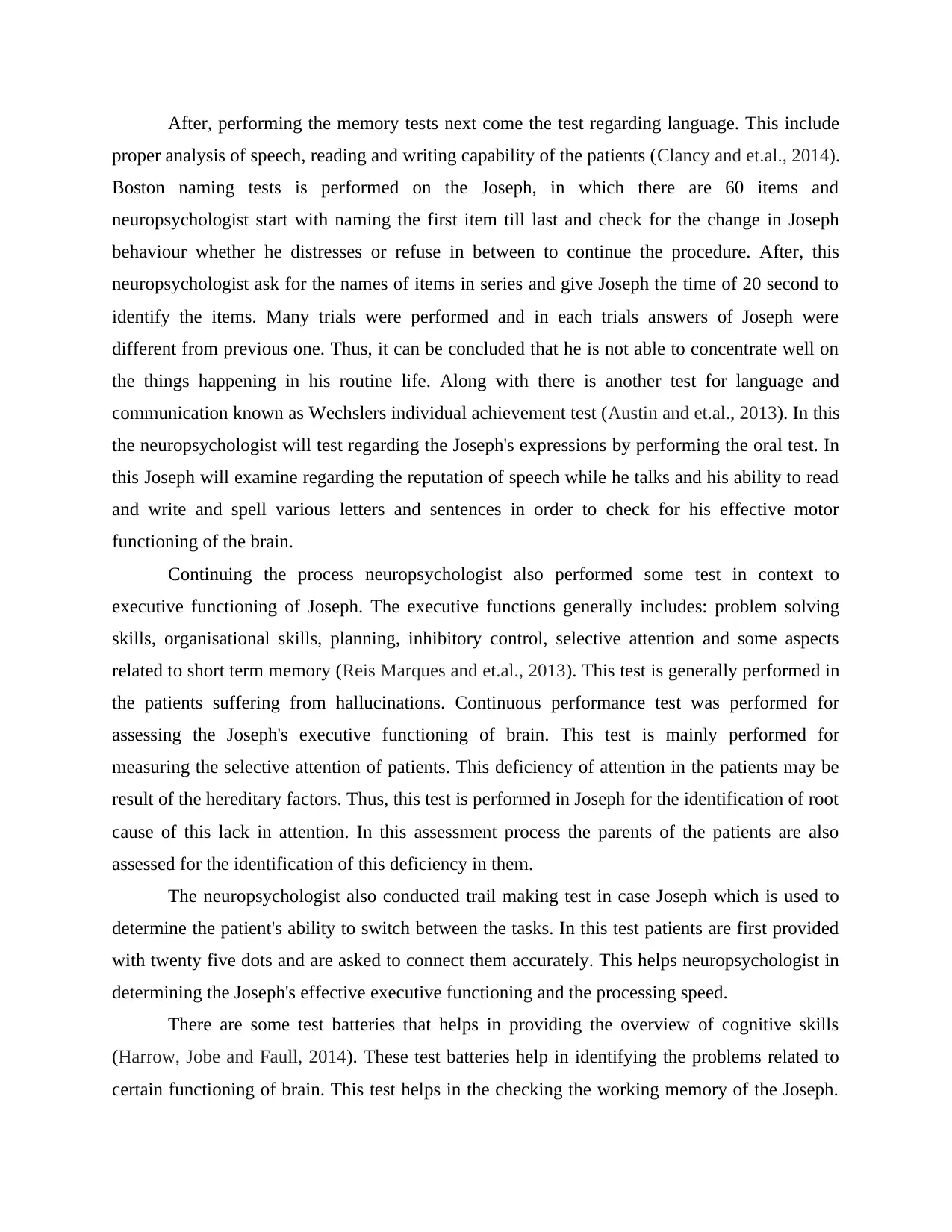
After, performing the memory tests next come the test regarding language. This include
proper analysis of speech, reading and writing capability of the patients (Clancy and et.al., 2014).
Boston naming tests is performed on the Joseph, in which there are 60 items and
neuropsychologist start with naming the first item till last and check for the change in Joseph
behaviour whether he distresses or refuse in between to continue the procedure. After, this
neuropsychologist ask for the names of items in series and give Joseph the time of 20 second to
identify the items. Many trials were performed and in each trials answers of Joseph were
different from previous one. Thus, it can be concluded that he is not able to concentrate well on
the things happening in his routine life. Along with there is another test for language and
communication known as Wechslers individual achievement test (Austin and et.al., 2013). In this
the neuropsychologist will test regarding the Joseph's expressions by performing the oral test. In
this Joseph will examine regarding the reputation of speech while he talks and his ability to read
and write and spell various letters and sentences in order to check for his effective motor
functioning of the brain.
Continuing the process neuropsychologist also performed some test in context to
executive functioning of Joseph. The executive functions generally includes: problem solving
skills, organisational skills, planning, inhibitory control, selective attention and some aspects
related to short term memory (Reis Marques and et.al., 2013). This test is generally performed in
the patients suffering from hallucinations. Continuous performance test was performed for
assessing the Joseph's executive functioning of brain. This test is mainly performed for
measuring the selective attention of patients. This deficiency of attention in the patients may be
result of the hereditary factors. Thus, this test is performed in Joseph for the identification of root
cause of this lack in attention. In this assessment process the parents of the patients are also
assessed for the identification of this deficiency in them.
The neuropsychologist also conducted trail making test in case Joseph which is used to
determine the patient's ability to switch between the tasks. In this test patients are first provided
with twenty five dots and are asked to connect them accurately. This helps neuropsychologist in
determining the Joseph's effective executive functioning and the processing speed.
There are some test batteries that helps in providing the overview of cognitive skills
(Harrow, Jobe and Faull, 2014). These test batteries help in identifying the problems related to
certain functioning of brain. This test helps in the checking the working memory of the Joseph.
proper analysis of speech, reading and writing capability of the patients (Clancy and et.al., 2014).
Boston naming tests is performed on the Joseph, in which there are 60 items and
neuropsychologist start with naming the first item till last and check for the change in Joseph
behaviour whether he distresses or refuse in between to continue the procedure. After, this
neuropsychologist ask for the names of items in series and give Joseph the time of 20 second to
identify the items. Many trials were performed and in each trials answers of Joseph were
different from previous one. Thus, it can be concluded that he is not able to concentrate well on
the things happening in his routine life. Along with there is another test for language and
communication known as Wechslers individual achievement test (Austin and et.al., 2013). In this
the neuropsychologist will test regarding the Joseph's expressions by performing the oral test. In
this Joseph will examine regarding the reputation of speech while he talks and his ability to read
and write and spell various letters and sentences in order to check for his effective motor
functioning of the brain.
Continuing the process neuropsychologist also performed some test in context to
executive functioning of Joseph. The executive functions generally includes: problem solving
skills, organisational skills, planning, inhibitory control, selective attention and some aspects
related to short term memory (Reis Marques and et.al., 2013). This test is generally performed in
the patients suffering from hallucinations. Continuous performance test was performed for
assessing the Joseph's executive functioning of brain. This test is mainly performed for
measuring the selective attention of patients. This deficiency of attention in the patients may be
result of the hereditary factors. Thus, this test is performed in Joseph for the identification of root
cause of this lack in attention. In this assessment process the parents of the patients are also
assessed for the identification of this deficiency in them.
The neuropsychologist also conducted trail making test in case Joseph which is used to
determine the patient's ability to switch between the tasks. In this test patients are first provided
with twenty five dots and are asked to connect them accurately. This helps neuropsychologist in
determining the Joseph's effective executive functioning and the processing speed.
There are some test batteries that helps in providing the overview of cognitive skills
(Harrow, Jobe and Faull, 2014). These test batteries help in identifying the problems related to
certain functioning of brain. This test helps in the checking the working memory of the Joseph.
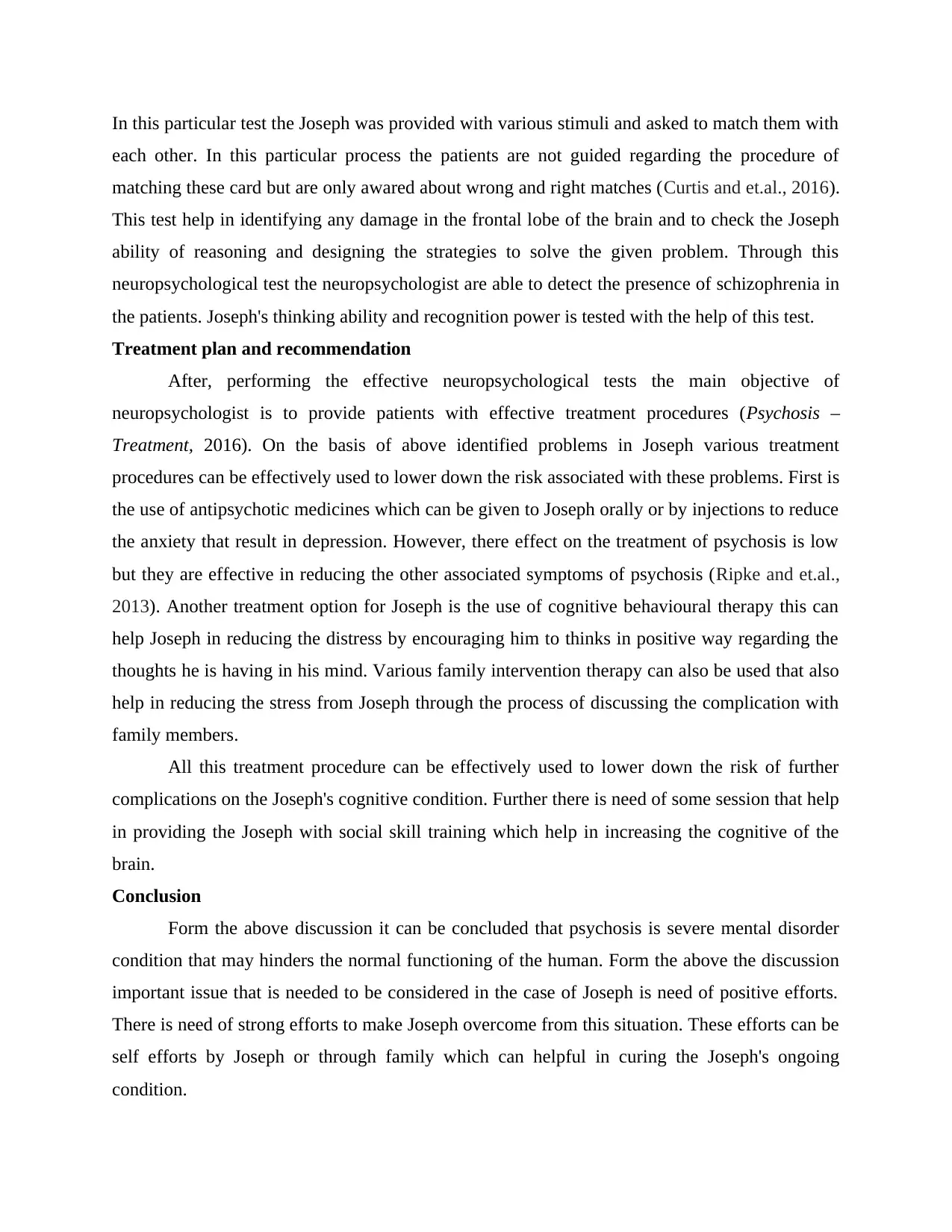
In this particular test the Joseph was provided with various stimuli and asked to match them with
each other. In this particular process the patients are not guided regarding the procedure of
matching these card but are only awared about wrong and right matches (Curtis and et.al., 2016).
This test help in identifying any damage in the frontal lobe of the brain and to check the Joseph
ability of reasoning and designing the strategies to solve the given problem. Through this
neuropsychological test the neuropsychologist are able to detect the presence of schizophrenia in
the patients. Joseph's thinking ability and recognition power is tested with the help of this test.
Treatment plan and recommendation
After, performing the effective neuropsychological tests the main objective of
neuropsychologist is to provide patients with effective treatment procedures (Psychosis –
Treatment, 2016). On the basis of above identified problems in Joseph various treatment
procedures can be effectively used to lower down the risk associated with these problems. First is
the use of antipsychotic medicines which can be given to Joseph orally or by injections to reduce
the anxiety that result in depression. However, there effect on the treatment of psychosis is low
but they are effective in reducing the other associated symptoms of psychosis (Ripke and et.al.,
2013). Another treatment option for Joseph is the use of cognitive behavioural therapy this can
help Joseph in reducing the distress by encouraging him to thinks in positive way regarding the
thoughts he is having in his mind. Various family intervention therapy can also be used that also
help in reducing the stress from Joseph through the process of discussing the complication with
family members.
All this treatment procedure can be effectively used to lower down the risk of further
complications on the Joseph's cognitive condition. Further there is need of some session that help
in providing the Joseph with social skill training which help in increasing the cognitive of the
brain.
Conclusion
Form the above discussion it can be concluded that psychosis is severe mental disorder
condition that may hinders the normal functioning of the human. Form the above the discussion
important issue that is needed to be considered in the case of Joseph is need of positive efforts.
There is need of strong efforts to make Joseph overcome from this situation. These efforts can be
self efforts by Joseph or through family which can helpful in curing the Joseph's ongoing
condition.
each other. In this particular process the patients are not guided regarding the procedure of
matching these card but are only awared about wrong and right matches (Curtis and et.al., 2016).
This test help in identifying any damage in the frontal lobe of the brain and to check the Joseph
ability of reasoning and designing the strategies to solve the given problem. Through this
neuropsychological test the neuropsychologist are able to detect the presence of schizophrenia in
the patients. Joseph's thinking ability and recognition power is tested with the help of this test.
Treatment plan and recommendation
After, performing the effective neuropsychological tests the main objective of
neuropsychologist is to provide patients with effective treatment procedures (Psychosis –
Treatment, 2016). On the basis of above identified problems in Joseph various treatment
procedures can be effectively used to lower down the risk associated with these problems. First is
the use of antipsychotic medicines which can be given to Joseph orally or by injections to reduce
the anxiety that result in depression. However, there effect on the treatment of psychosis is low
but they are effective in reducing the other associated symptoms of psychosis (Ripke and et.al.,
2013). Another treatment option for Joseph is the use of cognitive behavioural therapy this can
help Joseph in reducing the distress by encouraging him to thinks in positive way regarding the
thoughts he is having in his mind. Various family intervention therapy can also be used that also
help in reducing the stress from Joseph through the process of discussing the complication with
family members.
All this treatment procedure can be effectively used to lower down the risk of further
complications on the Joseph's cognitive condition. Further there is need of some session that help
in providing the Joseph with social skill training which help in increasing the cognitive of the
brain.
Conclusion
Form the above discussion it can be concluded that psychosis is severe mental disorder
condition that may hinders the normal functioning of the human. Form the above the discussion
important issue that is needed to be considered in the case of Joseph is need of positive efforts.
There is need of strong efforts to make Joseph overcome from this situation. These efforts can be
self efforts by Joseph or through family which can helpful in curing the Joseph's ongoing
condition.
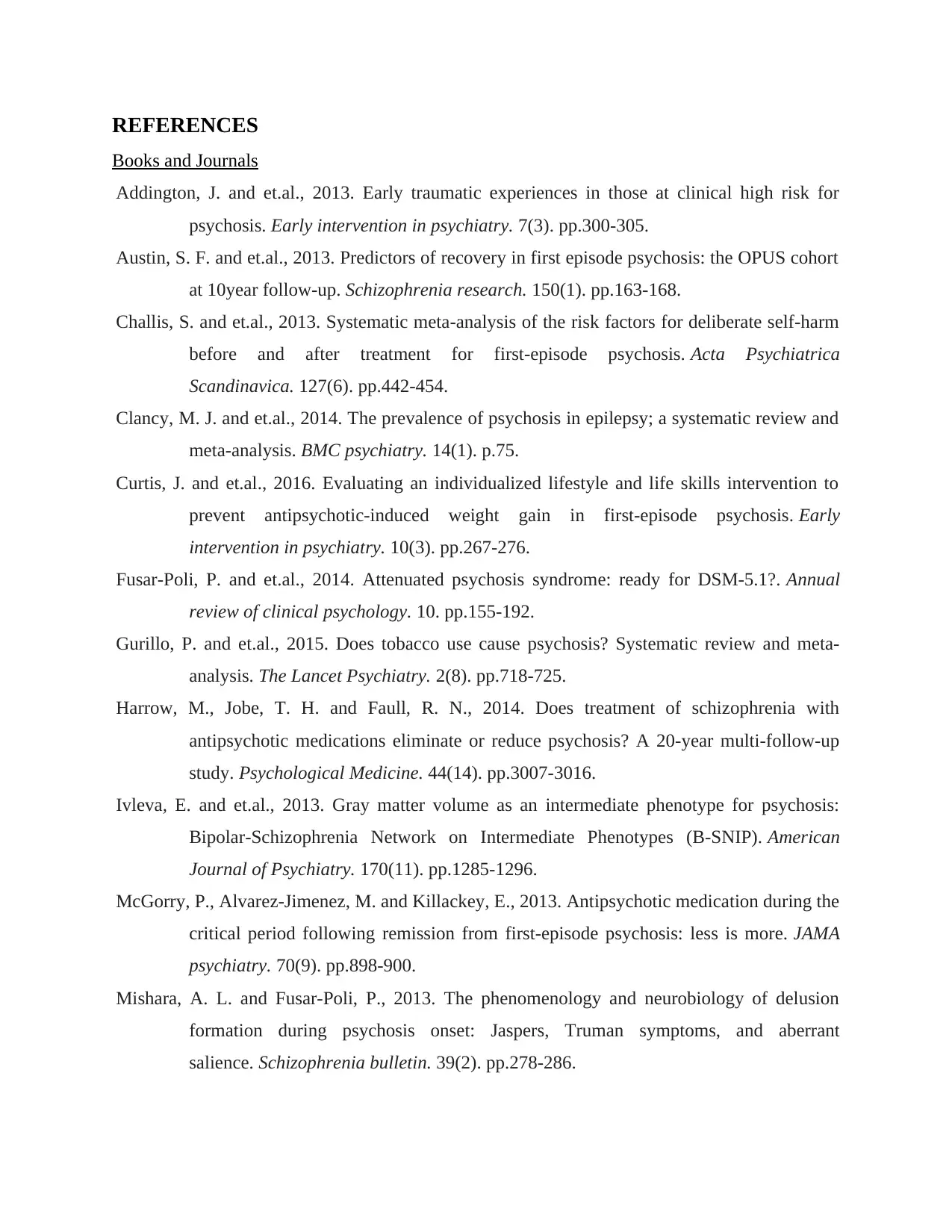
REFERENCES
Books and Journals
Addington, J. and et.al., 2013. Early traumatic experiences in those at clinical high risk for
psychosis. Early intervention in psychiatry. 7(3). pp.300-305.
Austin, S. F. and et.al., 2013. Predictors of recovery in first episode psychosis: the OPUS cohort
at 10year follow-up. Schizophrenia research. 150(1). pp.163-168.
Challis, S. and et.al., 2013. Systematic meta‐analysis of the risk factors for deliberate self‐harm
before and after treatment for first‐episode psychosis. Acta Psychiatrica
Scandinavica. 127(6). pp.442-454.
Clancy, M. J. and et.al., 2014. The prevalence of psychosis in epilepsy; a systematic review and
meta-analysis. BMC psychiatry. 14(1). p.75.
Curtis, J. and et.al., 2016. Evaluating an individualized lifestyle and life skills intervention to
prevent antipsychotic‐induced weight gain in first‐episode psychosis. Early
intervention in psychiatry. 10(3). pp.267-276.
Fusar-Poli, P. and et.al., 2014. Attenuated psychosis syndrome: ready for DSM-5.1?. Annual
review of clinical psychology. 10. pp.155-192.
Gurillo, P. and et.al., 2015. Does tobacco use cause psychosis? Systematic review and meta-
analysis. The Lancet Psychiatry. 2(8). pp.718-725.
Harrow, M., Jobe, T. H. and Faull, R. N., 2014. Does treatment of schizophrenia with
antipsychotic medications eliminate or reduce psychosis? A 20-year multi-follow-up
study. Psychological Medicine. 44(14). pp.3007-3016.
Ivleva, E. and et.al., 2013. Gray matter volume as an intermediate phenotype for psychosis:
Bipolar-Schizophrenia Network on Intermediate Phenotypes (B-SNIP). American
Journal of Psychiatry. 170(11). pp.1285-1296.
McGorry, P., Alvarez-Jimenez, M. and Killackey, E., 2013. Antipsychotic medication during the
critical period following remission from first-episode psychosis: less is more. JAMA
psychiatry. 70(9). pp.898-900.
Mishara, A. L. and Fusar-Poli, P., 2013. The phenomenology and neurobiology of delusion
formation during psychosis onset: Jaspers, Truman symptoms, and aberrant
salience. Schizophrenia bulletin. 39(2). pp.278-286.
Books and Journals
Addington, J. and et.al., 2013. Early traumatic experiences in those at clinical high risk for
psychosis. Early intervention in psychiatry. 7(3). pp.300-305.
Austin, S. F. and et.al., 2013. Predictors of recovery in first episode psychosis: the OPUS cohort
at 10year follow-up. Schizophrenia research. 150(1). pp.163-168.
Challis, S. and et.al., 2013. Systematic meta‐analysis of the risk factors for deliberate self‐harm
before and after treatment for first‐episode psychosis. Acta Psychiatrica
Scandinavica. 127(6). pp.442-454.
Clancy, M. J. and et.al., 2014. The prevalence of psychosis in epilepsy; a systematic review and
meta-analysis. BMC psychiatry. 14(1). p.75.
Curtis, J. and et.al., 2016. Evaluating an individualized lifestyle and life skills intervention to
prevent antipsychotic‐induced weight gain in first‐episode psychosis. Early
intervention in psychiatry. 10(3). pp.267-276.
Fusar-Poli, P. and et.al., 2014. Attenuated psychosis syndrome: ready for DSM-5.1?. Annual
review of clinical psychology. 10. pp.155-192.
Gurillo, P. and et.al., 2015. Does tobacco use cause psychosis? Systematic review and meta-
analysis. The Lancet Psychiatry. 2(8). pp.718-725.
Harrow, M., Jobe, T. H. and Faull, R. N., 2014. Does treatment of schizophrenia with
antipsychotic medications eliminate or reduce psychosis? A 20-year multi-follow-up
study. Psychological Medicine. 44(14). pp.3007-3016.
Ivleva, E. and et.al., 2013. Gray matter volume as an intermediate phenotype for psychosis:
Bipolar-Schizophrenia Network on Intermediate Phenotypes (B-SNIP). American
Journal of Psychiatry. 170(11). pp.1285-1296.
McGorry, P., Alvarez-Jimenez, M. and Killackey, E., 2013. Antipsychotic medication during the
critical period following remission from first-episode psychosis: less is more. JAMA
psychiatry. 70(9). pp.898-900.
Mishara, A. L. and Fusar-Poli, P., 2013. The phenomenology and neurobiology of delusion
formation during psychosis onset: Jaspers, Truman symptoms, and aberrant
salience. Schizophrenia bulletin. 39(2). pp.278-286.
Paraphrase This Document
Need a fresh take? Get an instant paraphrase of this document with our AI Paraphraser
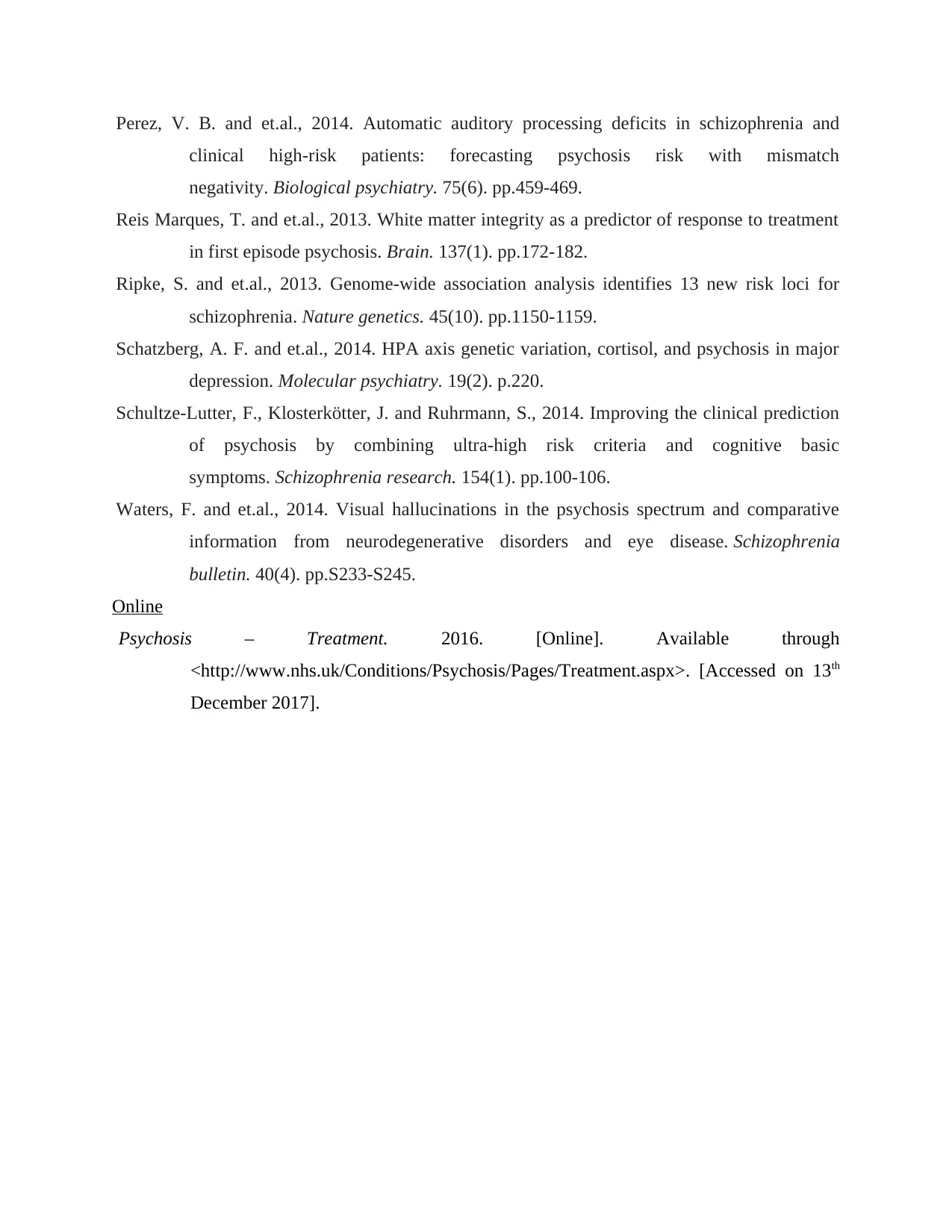
Perez, V. B. and et.al., 2014. Automatic auditory processing deficits in schizophrenia and
clinical high-risk patients: forecasting psychosis risk with mismatch
negativity. Biological psychiatry. 75(6). pp.459-469.
Reis Marques, T. and et.al., 2013. White matter integrity as a predictor of response to treatment
in first episode psychosis. Brain. 137(1). pp.172-182.
Ripke, S. and et.al., 2013. Genome-wide association analysis identifies 13 new risk loci for
schizophrenia. Nature genetics. 45(10). pp.1150-1159.
Schatzberg, A. F. and et.al., 2014. HPA axis genetic variation, cortisol, and psychosis in major
depression. Molecular psychiatry. 19(2). p.220.
Schultze-Lutter, F., Klosterkötter, J. and Ruhrmann, S., 2014. Improving the clinical prediction
of psychosis by combining ultra-high risk criteria and cognitive basic
symptoms. Schizophrenia research. 154(1). pp.100-106.
Waters, F. and et.al., 2014. Visual hallucinations in the psychosis spectrum and comparative
information from neurodegenerative disorders and eye disease. Schizophrenia
bulletin. 40(4). pp.S233-S245.
Online
Psychosis – Treatment. 2016. [Online]. Available through
<http://www.nhs.uk/Conditions/Psychosis/Pages/Treatment.aspx>. [Accessed on 13th
December 2017].
clinical high-risk patients: forecasting psychosis risk with mismatch
negativity. Biological psychiatry. 75(6). pp.459-469.
Reis Marques, T. and et.al., 2013. White matter integrity as a predictor of response to treatment
in first episode psychosis. Brain. 137(1). pp.172-182.
Ripke, S. and et.al., 2013. Genome-wide association analysis identifies 13 new risk loci for
schizophrenia. Nature genetics. 45(10). pp.1150-1159.
Schatzberg, A. F. and et.al., 2014. HPA axis genetic variation, cortisol, and psychosis in major
depression. Molecular psychiatry. 19(2). p.220.
Schultze-Lutter, F., Klosterkötter, J. and Ruhrmann, S., 2014. Improving the clinical prediction
of psychosis by combining ultra-high risk criteria and cognitive basic
symptoms. Schizophrenia research. 154(1). pp.100-106.
Waters, F. and et.al., 2014. Visual hallucinations in the psychosis spectrum and comparative
information from neurodegenerative disorders and eye disease. Schizophrenia
bulletin. 40(4). pp.S233-S245.
Online
Psychosis – Treatment. 2016. [Online]. Available through
<http://www.nhs.uk/Conditions/Psychosis/Pages/Treatment.aspx>. [Accessed on 13th
December 2017].
1 out of 8
Related Documents
Your All-in-One AI-Powered Toolkit for Academic Success.
+13062052269
info@desklib.com
Available 24*7 on WhatsApp / Email
![[object Object]](/_next/static/media/star-bottom.7253800d.svg)
Unlock your academic potential
© 2024 | Zucol Services PVT LTD | All rights reserved.





